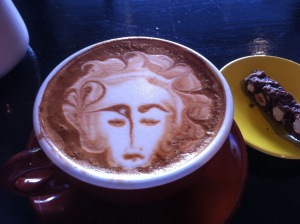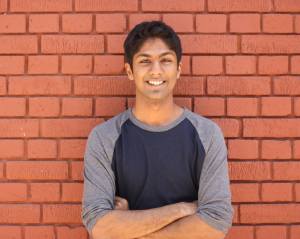(Listen to the audio version of this story, read by the author, here.)
I have two great inspirations. One is coffee. The beverage is the kick on the backside I need to start the day. I’m not one to wax eloquent but when it comes to coffee, well, I’d write a sonnet or two on it. Imagine then my excitement when my best friend called to tell me about a café that had opened a mile north of the town library. I was immediately moved to recite a line I believe was first uttered by Frost: “Life is incomplete without coffee, and a bit of toffee.” My friend’s subsequent silence indicated that he was taken by the Frostian ideal. This wasn’t surprising; Robert Frost could make getting lost in the woods rhyme.
I was a poet-in-the-making, an endeavour funded by my late father. He never got poetry during his lifetime, often walking away from me when I spoke to him in verse, but he had become a patron of Art in his afterlife when I sold his belongings to fund my literary quest. Being a poet was an expensive vocation; I had spent almost all his money, but I was yet to put pen on paper. One must not hurry such things. I was waiting for the mood to strike, to be so overcome by emotion that words would flow out of me with an unstoppable force. I knew that fame and fortune were but a poem away.
I set off to the new café, eager to let the coffee inspire me. My excitement was, however, dampened when I saw the place. It was a worn down cottage with a sign that simply read Coffee. I walked in to the sound of a belch. The source of the sound—a scrawny, half-asleep man scratching his armpit—stood behind the counter. He was an affront to the word ‘barista’.
“Morning,” I said.
“What do you want?” he asked, not returning my generous smile.
I leaned against the counter and asked for a cup of cappuccino. He scratched his head and pointed to a chalk board lit by a single bulb:
Menu
- Coffee
I tapped him on the head and pointed to number 1 on the menu. He placed a mug of lukewarm black coffee on the counter and shrugged when I asked for milk.
I surveyed the interiors of the place. It was dark and cave-like, the only light coming through an open window at the back. A narrow beam of sunlight illuminated a woman who sat by herself flipping through a book. She wore her hair up in a bun, a red rose pinned to one side. Her top was floral, and the colour of her rose matched her skirt. If the world was a botanical garden, she was its finest flower. Never mind the coffee, I had found my muse! My heart did a reverse backflip, and I knew hers would too once she laid eyes on me.
“Morning,” I said, taking the seat across from her. My gentlemanly tone must have been too soft for she failed to acknowledge my presence.
“Morning!” This time I shouted. Her startled look soon changed to one that could best be termed as searching.
My other great inspiration is women. I still look back fondly at the year I spent wooing Molly, the festively plump milkmaid. She played hard-to-get, once accidentally landing her fist on my nose, but over time my commitment to the cause convinced her to take me up on my offer for a home-cooked dinner. She left silently that night, right after eating my pasta, while I was in the restroom freshening up for possible late night revelries. The half hour we spent together though was exquisite, the highlight being the haiku I dedicated to her: Fair as milk, Molly; To love is not a folly; I can be your cow.
“No way,” the woman with the searching look said, breaking the silence that had overcome the situation. “No way! Is it really you?”
I saw excitement coursing through her. It was as if she had been travelling through life seeing one bare field after another, and then, seemingly out of nowhere, a vast mountain had appeared, magnificent, unreal. Best I could tell it really was me.
“Yes,” I said. As we looked deep in each other’s eyes, I took a sip of my coffee. It was tar-like, dark and viscous. My eyes watered as I resisted the urge to spit it back in the cup.
“Oh, Henry,” she said, tearing up as well. I figured it was a literary reference, and nodded understandingly. Before I could respond with a Frost reference of my own, she leaned over and landed a wet one right on the lips. By the time I had recovered, I was looking back at a woman clearly in love.
“I can’t believe it’s you. You’ve changed so much!” she said.
I’m an enemy of awkward silences. “Well, you know,” I said.
“It’s been ten years. I never thought I would see you again. When you called me last week, I couldn’t believe my ears.” She interwove her fingers with mine. “When you told me that you were now the Assistant Overseer of Daily Quarry Operations, I was so proud. And then when you mentioned how much you make… Oh, Henry!”
I was in the middle of a moment here, and as any of the Romantics would tell you, one must not break a moment, even if one has never worked in a quarry. So I pulled out the biggest note in my wallet, threw it on the table, and said, “There’s more where that came from.” Luckily, she looked away to compose herself, and I put the note back in my wallet.
“We had so many hopes and dreams when we were young,” she said, locking eyes with me again. “Grand plans to leave this boring town and travel the world, and then… and then one day you were gone.”
The smile on her face gave way to a look of contemplation. “But it’s okay.” She tapped a beat on the table. “You were young and stupid. Not anymore,” she said, the smile returning. “Now that you’re here, and I’m here…” she blushed, “how about we get married?” Before I could react, my face was grabbed, not that I protested, and my lips were out of commission for a good minute.
“Get married?” I asked, as our lips parted.
“Just like we had talked about years ago. You and me, together. Husband and wife.”
The kissing was definitely a step in the right direction, but it seemed like we were sprinting down a path I preferred to jog on, nay walk slowly on, with frequent breaks to take in the scenery. I had merely desired a sensuous, passionate affair, one that was certain to inspire a poem in me. I couldn’t get married—what if Molly came back to me one day, the haiku still ringing in her ears? The moment needed breaking.
“I think there’s been a misunderstanding,” I said.
“What’s going on?” she asked, her voice stern. I put on my best smile and said, “There’s an undeniable chemistry here. And the kissing was quite nice. What I’m trying to get at is, well, I’m not the person you think I am.”
Her reaction to this devastating piece of news was odd. She moved close to me, ran her fingers through my hair and whispered, “I know.” I graciously let her do what she had to do to cope.
“You do?”
“Of course I do. You’re not the man I knew ten years ago. The selfish, impulsive bastard who broke my heart.” There was more hair touching. “You’ve changed. You’ve come back to live the rest of your life with me.” She continued her homage to the changed me. While she wondered out loud what we should name our kids, a voice appeared behind me, the heavy breathing of its owner making its presence felt on my neck. “Sara?” it said.
“Yes… wait, what?” She let go of my hair and looked past me, confused.
“Sara, what’s going on?” the voice asked, angry.
I turned around to see the shape of a man my height but bulkier at the waist.
“Who the hell is this?” he yelled. He stepped into the light and I noticed that his breathing was causing his moustache to vibrate—a sight that would have elicited laughter all around had the circumstances been merrier. The barista woke up to the noise and stared without emotion at the scene in his café. He then pulled up a chair a couple of feet from us to get a better view.
“It’s probably best I excuse myself,” I said, getting up only to be pushed back down by the moustached man.
“I come into town to ask for your hand, Sara… and here you are romancing this buffoon?”
I moved his hand off of my shoulder and stood up to face him.
“So you’re O. Henry!” I said. “I understand you’re frustrated. I would, however, prefer if we stayed away from calling each other buf” I was stopped mid-sentence by O. Henry’s forehead running into mine.
“If you’re Henry, who is this?” Sara asked pointing to me on the floor.
“Misunderstanding,” I mumbled, clutching my forehead.
“Yes, there has been a misunderstanding,” O. Henry said, his voice going soft. “I thought you still loved me, Sara.” His moustache trembled further. “I see that you’ve moved on with your life.” He began to tear up. It was all getting a bit too embarrassing for my taste. “I don’t want to stand in your way any longer!” he said. His walk out had only a short pause, one that was instigated by his need to punch a hole through the wall.
The remainder of my stay at the café was tough on my body and my wallet. I was forced to foot the bill for a pitiful cup of coffee, the hole O. Henry put in the wall, and a chair that Sara broke against my midriff before storming out. I had come to the café in search of a poem, a mere foot soldier serving at the pleasure of Great Art, but here I was stumbling out with an empty wallet and a bruised gut.
By the door, lay a rose that must have fallen off Sara’s hair. Even though dirt from the floor had stuck to it, and some petals had come apart, it looked beautiful, perhaps even more beautiful than before. I kneeled down beside it. It had witnessed tragedy, but its spirit could not be defeated, for one cannot rid a rose of its sweet fragrance!
The sight was… poetic.
Niyantha Shekar’s work has appeared in The Aerogram, Asian Review of Books, Nazar Magazine and as an Editor’s Pick on Medium.com. His writing can be seen at niyantha.com.
Cover image: Photo courtesy: https://www.flickr.com/photos/fifikins

